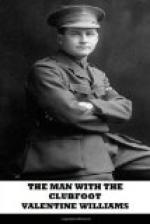“Therefore, a sharp eye was kept on his correspondence, and one day this letter was seized. It was, I believe, perfectly harmless to the eye, but the expert to whom it was eventually submitted soon detected a conventional code in the chatty phrases about the daily life of the camp. It proved to be a communication from Schulte to a third party relating to a certain letter which, apparently, the writer imagined the third party had a considerable interest in acquiring. For he offered to sell this letter to the third party, mentioning a sum so preposterously high that it attracted the earnest attention of our Intelligence people. On half the sum mentioned being paid into the writer’s account at a certain bank in London, the letter went on to say, the writer would forward the address at which the object in question would be found.”
“It was a simple matter to send Schulte a letter in return, agreeing to his terms, and to have the payment made, as desired, into the bank he mentioned. His communication in reply to this was duly stopped. The address he gave was that of a house situated on the outskirts of Cleves.
“We had no idea what this letter was, but its apparent value in the eyes of the shrewd Mr. Schulte made it highly desirable that we should obtain possession of it without delay. Four of us were selected for this dangerous mission of getting into Germany and fetching it, by hook or by crook, from the house at Cleves where it was deposited. We four were to enter Germany by different routes and different means and to converge on Cleves (which is quite close to the Dutch frontier).
“It would take too long to tell you of the very exact organization which we worked out to exclude all risk of failure and the various schemes we evolved for keeping in touch with one another though working separately and in rotation. Nor does it matter very much how I got into Germany. The fact is that, at my very first attempt to get across the frontier, I realized that some immensely powerful force was working against me.
“I managed it, with half a dozen hairbreadth escapes, and I set down my success solely to my knowledge of German and to that old trick of mine of German imitations. But I felt everywhere the influence of this unseen hand, enforcing a meticulous vigilance which it was almost impossible to escape. I was not surprised, therefore, to learn that two of my companions came to grief at the very outset.”
My brother lowered his voice and looked about him.
“Do you know what happened to those two gallant fellows?” he said. “Jack Tracy was found dead on the railway: Herbert Arbuthnot was discovered hanging in a wood. ‘Suicide of an Unknown Individual’ was what the German papers called it in each case. But I heard the truth ... never mind how. They were ambushed and slaughtered in cold blood.”
“And the third man you spoke of?” I asked.
“Philip Brewster? Vanished, Des ... vanished utterly. I fear he, too, has gone west, poor chap!




